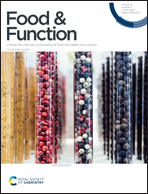Fish allergens of turbot (Scophthalmus maximus) parvalbumin triggers food allergy via inducing maturation of bone marrow derived dendritic cells and driving Th2 immune response†
Abstract
Aquatic food allergy has become a key food safety problem and therefore it is urgent to study the mechanism of aquatic food allergy. Turbot parvalbumin (PV) is a major marine food allergen that could cause allergic reactions but the cellular and molecular mechanisms remain to be defined. In this study, we used flow cytometry and ELISA, a coupled co-culture system of dendritic cells and T cells, and revealed that PV could promote the maturation of dendritic cells, mainly by inducing bone marrow-derived dendritic cells (BMDCs) to express MHC II and CD86, and promote the cytokines/chemokines IL-6, IFN-γ, IL-23, and IL-12p70, whereas inhibiting TNF-α expression. Our results suggested that murine BMDCs play a crucial role in the effect of PV on the induction of Th2 responses.



 Please wait while we load your content...
Please wait while we load your content...